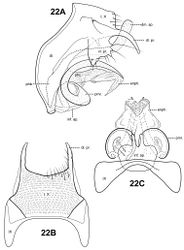Itauara spiralis
| Notice: | This page is derived from the original publication listed below, whose author(s) should always be credited. Further contributors may edit and improve the content of this page and, consequently, need to be credited as well (see page history). Any assessment of factual correctness requires a careful review of the original article as well as of subsequent contributions.
If you are uncertain whether your planned contribution is correct or not, we suggest that you use the associated discussion page instead of editing the page directly. This page should be cited as follows (rationale):
Citation formats to copy and paste
BibTeX: @article{Robertson2011ZooKeys114, RIS/ Endnote: TY - JOUR Wikipedia/ Citizendium: <ref name="Robertson2011ZooKeys114">{{Citation See also the citation download page at the journal. |
Ordo: Trichoptera
Familia: Glossosomatidae
Genus: Itauara
Name
Itauara spiralis Robertson & Holzenthal sp. n. – Wikispecies link – ZooBank link – spiralis Pensoft Profile
Description
This species is distinct in having a sclerotized, tubular phallicata, and an elongate, laterally compressed, dorsomesal spine. The phallicata in other species are less tubular, appearing as a dorsal sheath. This dorsal sheath was identified as a synapomorphy for the genus in a previous phylogenetic study of Protoptilinae (see Chapter 1, this work). Itauara spiralis was not included in that study, however, Itaura spiralis is placed in Itauara since it shares many other characteristics common to the genus such as an inferior appendage process, and a tergum X that is nearly identical to Itaura bidentata sp. n. and Itaura unidentata sp. n.
Itauara spiralis can be recognized by the extremely curved, spiral-shaped parameres. Itaura ovis sp. n., also has highly curved, spiral shaped parameres, but in Itaura spiralis, the paramere is curved along the entire length of the paramere, whereas in Itaura ovis, the paramere is curved basally, but straight distally. The 2 species differ in other respects, including the shape of the inferior appendage process, which is bifid in Itaura spiralis and inflated apically in Itaura ovis. The 2 species also differ in the shape of tergum X and the phallicata. Tergum X is very similar to those of Itaura bidentata and Itaura unidentata; all have elongate, finger-like dorsolateral processes and broad, irregular, setose ventrolateral processes. Itauara spiralis is distinguished from these other 2 species by having a bifid inferior appendage process, spiral-shaped parameres, and laterally compressed dorsomesal spine.
Adult. The only specimen of this species is in very poor condition. Therefore, head, thoracic, and wing characters could not be observed. However, the genitalia are intact.
Male genitalia. Preanal appendages absent. Segment IX ventrally narrow, broad medially; anterior margin rounded; posterolateral margin membranous or very lightly sclerotized; sternum IX without modification. Tergum X incompletely fused to tergum IX with membrane or lightly sclerotized region ventrolaterally; dorsomesal margin straight, shallowly excavate; dorsolateral margin with paired elongate, down-turned, finger-like process; ventrolateral margin with paired, very broad flange-like setose process consisting of several small irregular lobes. Inferior appendages present as apically bifid, setose process produced mesally, broadest at base and fused to phallobase ventrobasally. Parameres present, paired, arising laterally from endotheca, spiral-shaped, curving 360 degrees at base with curve continuing to apex, directed posteroventrally, apex pointed. Phallobase reduced, lightly sclerotized. Phallicata forming a short slerotized dorsal tube extending from phallobase, with a long, broad dorsomesal spine arising posteriorly to phallobase. Endophallus membranous, rather small, apically sharply bent downward, pointing anteroventrally.
Material examined
Holotype male: GUYANA: Paramakatoi: 04°42'00"N, 059°42'48"W, 24–25.viii.1997 (W.N. Mathis) (UMSP0000210960) (NMNH).
Etymology
The name spiralis refers to the spiral form of the parameres.
Original Description
- Robertson, D; Holzenthal, R; 2011: Revision of the Neotropical caddisfly genus Itauara Müller, 1888 (Trichoptera, Glossosomatidae) ZooKeys, 114: 41-100. doi
Images
|
